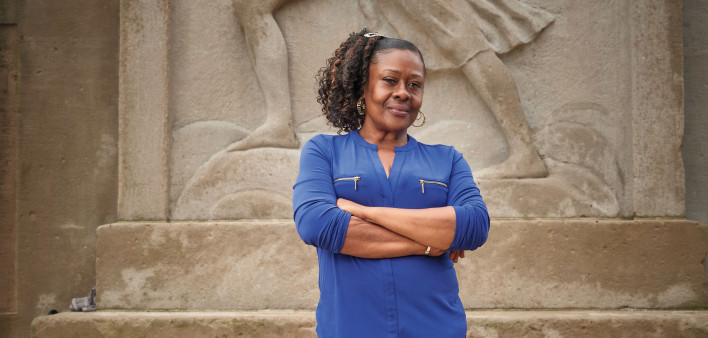Over the years, Michelle Lopez, a bisexual woman living with HIV, has shown how resilient, empowered individuals and communities can serve as agents for positive change. She would know. The daughter of a Black mother and a Latino father, the long-term survivor has overcome racial and ethnic health disparities.
Lopez moved to New York City from her native Trinidad in 1979, when she was 16 years old. In 1990, she gave birth to a daughter; soon thereafter, she began to feel sick. When she took her baby to a hospital, a doctor advised Lopez to get tested for HIV. She was taken aback, since at the time, she thought only men who had sex with other men could get the virus. She and her daughter both tested HIV positive.
“The man I was with at the time was beating me morning, noon and night,” she says. “I eventually wrapped my baby up in a blanket and left the house and started riding the trains.”
Her subway ride that day started in Queens and ended in Brooklyn, where she saw an ad welcoming immigrant women to call a helpline for support. “When I called that number, a voice answered, not a machine. It turned out I was literally standing five blocks away from that person. She directed me how to get to the Community Planning Family Council.”
That agency proved to be Lopez’s door to health care for her and her baby. The agency placed them in a shelter for battered women, where they stayed for 11 months. “There weren’t a lot of services being offered to me as an undocumented immigrant. I came down with PCP [pneumocystis pneumonia] and had to be hospitalized. That diagnosis made me eligible for AIDS services from the city.”
While living in the shelter, Lopez started doing street outreach to raise awareness of the importance of HIV testing. Soon, the number of people seeking HIV testing at the council surged. Her case manager told her one day that the organization’s executive director wanted to meet with her. “She offered me a job on the spot, and she asked me to tell all the directors in the room what I was doing through outreach to get so many people to come in for testing.”
Lopez was proactive about getting the help she needed, and her efforts paid off. The Partnership for the Homeless got her out of the shelter and into a place of her own. The legal department at Gay Men’s Health Crisis, now known simply as GMHC, helped Lopez and her sister become naturalized citizens.
Lopez developed a taste for activism. She testified before the Food and Drug Administration to successfully open up HIV clinical trials to the participation of women and children. She worked with the New York State AIDS Institute to form the Leadership Training Institute, which has now trained thousands of people living with HIV on self-care and how to become involved in the AIDS response. Lopez has served as a community adviser for the AIDS Clinical Trials Group and today is working with the Albert Einstein College of Medicine in New York City on research regarding the needs of people aging with HIV as well as young adults born with the virus.
Actively participating in your own health care is essential, Lopez says. “You are aging. You are a long-term survivor. You have cognitive issues. I tell my doctors they can’t sit back on this. I probe. I ask questions. If I don’t understand something, I ask. If I don’t feel I have a real partnership with the doctor, then I know that doctor can’t work with me.”
Lopez has accomplished a lot and is recognized as a pioneer and leader in her community, both in New York and nationally. But she knows there is a lot more to do.
“When I’m around these decision-making tables, I speak about immigrants. I speak about women of color. I speak about the LGBTQ community. And I speak about being a mom and a grandmother. But it is so concerning that there aren’t more men and women of color around these tables.
“When I look at communities of color, I know there are things we can do. There are things we can fix. My plea is that people of color recognize that you don’t have to be a rocket scientist to become involved.”
Lopez has at times bristled at the tokenism she has encountered when it comes to her community engagement and advocacy. “I’m not just [at these health policy tables] because I am living with HIV or because I have Medicaid. I am here because I have a brain, and I need to be respected because I have ideas about how we can make things better.”
As a mother and a grandmother, an adviser on important scientific studies and a tireless advocate, Lopez is doing her part to reduce racial and ethnic disparities in health.
HIV prevention is everyone’s responsibility. To find out more about HIV prevention and how to access free home HIV tests, visit the Centers for Disease Control and Prevention’s “Let’s Stop HIV Together” website at https://bit.ly/takemehome_1.







Comments
Comments